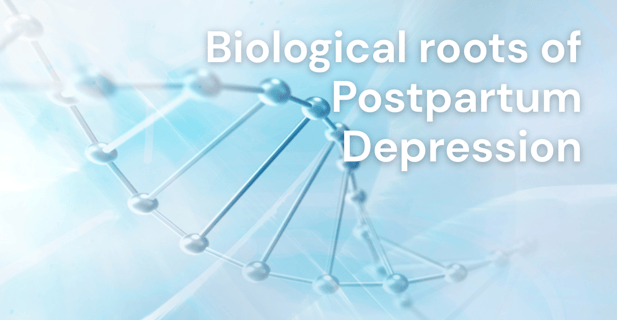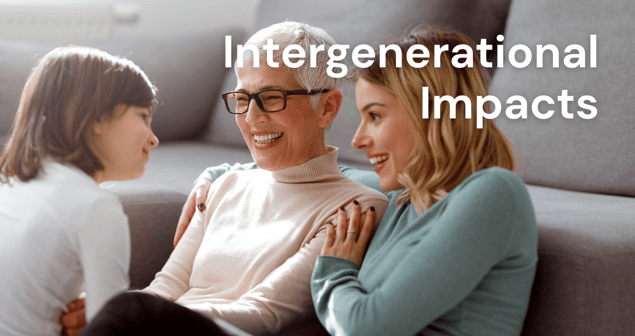Genetic and Epigenetic Links to Postpartum Depression
6/10/20254 min read
Postpartum depression (PPD) is often understood as a result of hormonal shifts, sleep deprivation, or environmental stress. But beneath those surface triggers lies something deeper: our biology. In recent years, researchers have turned their attention to the genetic and epigenetic underpinnings of PPD, uncovering how our DNA—and how it's expressed—may shape our risk of developing this complex mood disorder.
Understanding these links doesn’t mean postpartum depression is inevitable or irreversible. Instead, it offers valuable insight into why some people are more vulnerable than others and helps reduce the stigma that PPD is simply a result of being "too emotional" or "not strong enough."
At Peace Temple, we believe that exploring the biological roots of postpartum depression empowers parents, not with fear, but with clarity and compassion.


The Genetic Connection: Inherited Vulnerability
Genes don’t determine destiny, but they do influence susceptibility. Decades of psychiatric research show that people with a family history of depression, anxiety, or bipolar disorder are more likely to experience postpartum mood disorders.
Specific Genes Implicated
While no single "postpartum depression gene" has been discovered, several genetic variants are thought to play a role:
HTR2A and SLC6A4: Linked to serotonin regulation, these genes affect mood stability and have been associated with both major depression and PPD.
BDNF (Brain-Derived Neurotrophic Factor): This gene influences brain plasticity and stress response; altered BDNF function has been linked to postpartum mood disturbances.
OXTR (Oxytocin Receptor Gene): Variations in this gene may affect bonding, emotional regulation, and maternal behaviour—all key aspects of the postpartum experience.
What’s important to note is that these genes don’t act alone. They interact with one another—and with environmental factors—to influence whether or not a person develops symptoms.
At Peace Temple, our therapists incorporate family mental health histories into intake assessments, helping clients understand the role genetics may play in their emotional experiences.
The Role of Epigenetics: Genes in Context
If genetics are the blueprint, epigenetics are the instructions written in the margins—telling genes when to turn on or off, and how loudly to “speak.” Epigenetic changes are influenced by environment, behaviour, nutrition, stress, and trauma, especially during sensitive life phases like pregnancy and postpartum.
How Epigenetics Affects PPD
Recent research shows that stressful life events, trauma, and chronic inflammation can alter gene expression in ways that heighten the risk for depression:
Exposure to prenatal stress can epigenetically modify cortisol regulation in both mother and child.
Lack of sleep, poor diet, or ongoing emotional neglect may amplify depressive gene activity post-birth.
Maternal caregiving behaviours (like touch and verbal reassurance) can reverse some of these changes in infants—an incredible testament to the healing power of connection.
In essence, your biology responds to your environment. And the good news is, epigenetic changes can also be reversed. Therapeutic interventions, improved nutrition, emotional support, and lifestyle changes can help rewrite how genes are expressed.
Peace Temple’s integrative care model supports these changes, combining therapy with nutritional guidance, mindfulness practices, and body-based healing modalities.


Intergenerational Impacts: When Biology Spans Generations
Epigenetic changes don't just impact the present—they can ripple forward into the next generation. This is where the field of intergenerational trauma overlaps with postpartum mental health.
For example, a mother who experienced childhood trauma may carry epigenetic markers that increase her sensitivity to stress and depressive episodes after birth. These same markers may be passed on to her baby, influencing the child’s stress regulation system and emotional development.
It’s not just about inherited trauma—it’s also about inherited resilience. Loving care, emotional attunment, and therapeutic support can buffer genetic risk, providing a powerful counterforce to inherited vulnerabilities.
At Peace Temple, we help mothers and families recognize these patterns—not as a burden, but as an opportunity for healing cycles, not repeating them.
Why This Research Matters
Learning about genetic and epigenetic risk factors for PPD serves three important purposes:
Reduces stigma: Knowing that biology plays a role helps parents move away from self-blame.
Improves screening: Healthcare providers can identify high-risk individuals earlier—especially those with relevant family histories.
Informs personalized care: Treatment can be tailored based on a parent’s unique risk profile, making interventions more effective.
Peace Temple’s therapists work with each client to develop personalized plans that address both internal and external factors—from biological predisposition to social stressors.
What If I Have a Genetic Risk?
If you know you have a family history of mental illness—or you’ve experienced depression or anxiety yourself—it’s important to be proactive, not afraid. Risk is not a guarantee.
Here’s what you can do:
Start mental health support early, even during pregnancy
Educate your partner or support system about warning signs
Practice stress-reducing habits such as meditation, exercise, or journaling
Keep lines of communication open with healthcare providers
Join a supportive community like Peace Temple’s online and in-person groups
Being aware of your risk empowers you to seek help before symptoms become severe.
Final Thoughts: Biology Isn’t Destiny
Your genes are only part of the story. They carry whispers from your ancestors—but they do not write your future. The emerging science of genetics and epigenetics is not about fatalism—it’s about agency. Understanding your emotional blueprint allows you to nurture yourself with more insight and compassion.
At Peace Temple, we believe that even when biology stacks the odds, support, empathy, and tailored care can shift the outcome. Postpartum depression doesn’t define you. With the right help, your story can still unfold with healing, strength, and connection.
